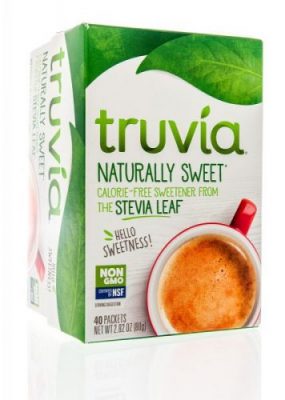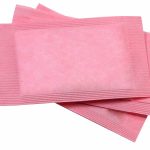I’ve always been vocal about the many ways the makers of artificial sweeteners have tried to pull the wool over our eyes. They are all bad for you, but some of the worst are Truvia and Splenda Naturals Stevia Sweetener.
It started when Truvia was launched about 15 years ago. The company latched onto a highly successful marketing strategy. They touted this new product as a “naturally sweet and calorie-free sweetener from the stevia leaf.”
I’ll be very clear here. Truvia is not even close to being the same thing as natural stevia.
In fact, the product doesn’t contain even a single ounce of steviosides. These are the sweet tasting compounds in stevia that have a positive effect on insulin sensitivity, blood sugar, blood pressure and weight. And they are one of the top reasons I advocate using natural stevia as a sweetener.
Instead, Truvia only has a tiny and insignificant amount of rebaudioside in it. And while this compound actually does come from the stevia plant, it doesn’t have the same health benefits as steviosides.
It also turns out the true main sweetener in Truvia is erythritol. But there’s nothing natural about it. It’s a sugar alcohol made from genetically altered corn.
Later, Heartland Food Products Group grabbed onto the same concept to market Splenda Naturals Stevia Sweetener when they launched it.
But the deception goes much further than that.
Erythritol Linked to Heart Attack, Stroke
Just recently, researchers at the Cleveland Clinic were looking for compounds in blood that might help predict the risk of a future heart attack or stroke. They analyzed blood from more than 4,000 people in the U.S. and Europe.
What they discovered is that people with the highest erythritol levels (top 25%) were about twice as likely to have a heart attack, stroke or cardiovascular death over the next three years than those with the lowest levels (bottom 25%).
Of course, once they learned this, the team had another big question. Exactly how does erythritol increase the risk of these cardiovascular events?
After running further tests, they learned that this sugar alcohol increases the formation of blood clots. Ultimately, it causes platelets to stick together. So little tiny blood clots become bigger blood clots that can cause a massive thrombosis and result in a stroke or a heart attack.
In a final phase of the study, eight volunteers drank a beverage sweetened with 30 grams of erythritol. This was enough to increase blood levels of erythritol by a thousandfold and remain high for the next two to three days – high enough to trigger changes in platelet function and heighten clotting risk.
As if all of this news isn’t bad enough, there is another thing about this study that I find deeply disturbing.
About 75% of the participants had narrowing or blockage of their coronary arteries or high blood pressure. Around 20% were diabetic. And about half of them were in their 60’s and 70’s.
These are the same people who are likely to use artificial sweeteners in an effort to improve their health and control blood sugar. And they are the very last people who should be using a sweetener tied to heart attack, stroke and clotting!
The biggest deception?
Because erythritol is a naturally occurring compound, the FDA does not require any long-term safety studies on its use. At the same time, food companies don’t have to list erythritol on their nutrition labels.
The problem is, the amount of erythritol used in foods are a lot higher than your body can safely handle. Remember, in the last phase of the study, ingesting just thirty grams of it was enough to make blood levels of erythritol go up a thousandfold!
The Unintended Consequences of “Safe” Sugar Substitutes
Erythritol isn’t the only zero calorie sweetener that is linked to heart attack and stroke.
In September, 2022, the British Medical Journal released a massive study. It spanned more than a decade and evaluated artificial sweetener intake among over 100,000 people.
What they discovered is that people who had the greatest intake of fake sweeteners were at a much higher risk of cardiovascular disease.
In particular, acesulfame potassium (Ace-K, Sweet One®) and sucralose (Splenda®) were associated with an increased chance coronary heart disease, which is defined by plaque build-up in the arteries that supply blood to the heart… and can lead to a heart attack. Aspartame (Nutrasweet®, Equal®) was associated with a higher risk of stroke.
So as far as I’m concerned, there is no safe artificial sweetener.
In an ideal world, we wouldn’t need them. We would be eating more wholesome, natural foods that aren’t loaded down with added sugars. And we would add less sugar to the foods we make at home – no more than nine teaspoons of raw cane sugar daily.
But if you feel you really need a no-calorie sweetener, I recommend 100% natural stevia. It’s a safe, calorie-free sweetener that doesn’t carry any of the risks you find with artificial sweeteners.
SOURCES:
Witkowski M, Nemet I, Alamri H, Wilcox J, Gupta N, Nimer N, Haghikia A, Li XS, Wu Y, Saha PP, Demuth I, König M, Steinhagen-Thiessen E, Cajka T, Fiehn O, Landmesser U, Tang WHW, Hazen SL. The artificial sweetener erythritol and cardiovascular event risk. Nat Med. 2023 Mar;29(3):710-718.
Artificial Sweetener Erythritol’s Major Health Risks. Cleveland Clinic. News article Mar 2023.
Debras C, Chazelas E, Sellem L, Porcher R, Druesne-Pecollo N, Esseddik Y, de Edelenyi FS, Agaësse C, De Sa A, Lutchia R, Fezeu LK, Julia C, Kesse-Guyot E, Allès B, Galan P, Hercberg S, Deschasaux-Tanguy M, Huybrechts I, Srour B, Touvier M. Artificial sweeteners and risk of cardiovascular diseases: results from the prospective NutriNet-Santé cohort. BMJ. 2022 Sep 7;378:e071204.



